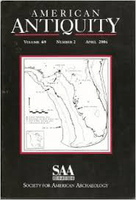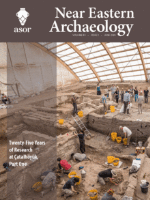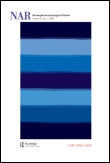
Journal of African Archaeology
Scope & Guideline
Fostering Insights into Africa's Archaeological Legacy
Introduction
Aims and Scopes
- Interdisciplinary Research:
The journal encourages research that integrates archaeology with other disciplines such as anthropology, history, and environmental science, providing a holistic view of African cultures. - Cultural Heritage and Identity:
A core aim is to explore the links between archaeology and contemporary cultural identities, examining how past societies shape present-day communities. - Technological Innovations in Archaeology:
The journal focuses on the application of modern technologies and methodologies in archaeological research, including isotopic analysis, geophysical surveying, and advanced dating techniques. - Regional Archaeology:
Significant emphasis is placed on regional studies across Africa, highlighting the unique archaeological narratives of different areas, such as North Africa, Sub-Saharan Africa, and the islands. - Socio-Economic Dynamics:
Research often addresses the socio-economic aspects of ancient societies, including trade, resource management, and the impacts of climate change on cultural development.
Trending and Emerging
- Population Dynamics and Mobility:
Recent publications emphasize the investigation of population movements and dynamics through innovative methodologies like isotopic analysis, shedding light on migration patterns in ancient communities. - Textile Production and Use:
There is a growing interest in textiles as cultural artifacts, exploring their roles in funerary practices and daily life, which highlights the complexity of social identities. - Climate Change and Resilience:
Research addressing the impacts of climate change on ancient societies is increasingly common, focusing on how communities adapted to environmental shifts. - Interdisciplinary Approaches to Archaeology:
Emerging themes reflect a strong trend towards interdisciplinary research, combining archaeology with history, anthropology, and environmental sciences to provide comprehensive insights. - Local Community Engagement in Archaeology:
An increasing number of studies focus on the role of local communities in archaeological research, emphasizing participatory approaches and the importance of cultural heritage in contemporary society.
Declining or Waning
- Traditional Historical Narratives:
There seems to be a waning interest in traditional historical narratives that focus solely on elite histories or monumental architecture, as newer research emphasizes everyday life and community practices. - Isolated Archaeological Studies:
Research that focuses on isolated archaeological sites without broader contextual analysis is becoming less common, with a shift towards studies that integrate findings within wider regional or thematic frameworks. - Colonial Archaeology:
Topics centered solely on colonial impacts without connecting to indigenous perspectives are less frequently addressed, reflecting a growing emphasis on post-colonial narratives and local agency. - Static Cultural Representations:
The portrayal of African cultures as static or unchanging is declining, with more studies highlighting dynamic interactions and cultural exchanges over time. - Focus on Material Culture Alone:
There is a noticeable decrease in studies that focus exclusively on material culture without considering the social and historical contexts, as interdisciplinary approaches gain prominence.
Similar Journals

Journal of Pacific Archaeology
Illuminating the Past, Shaping the Future of the PacificThe Journal of Pacific Archaeology, published by the New Zealand Archaeological Association, serves as a pivotal platform for disseminating cutting-edge research in the field of archaeology across the Pacific region. With an ISSN of 1179-4704 and an E-ISSN of 1179-4712, the journal provides a forum for scholarly discourse aimed at both established researchers and emerging scholars alike. Focusing on the rich tapestry of archaeological studies, it covers a diverse array of topics, from ancient settlement patterns and cultural practices to contemporary analyses of material culture. As an Open Access journal, it ensures that its findings are readily available to all, fostering inclusivity in academic research and enabling practitioners to share knowledge without barriers. The Journal of Pacific Archaeology is indispensable for those committed to understanding the complexities and nuances of Pacific archaeology, making significant contributions to both regional and global archaeological narratives.

California Archaeology
Pioneering Research in California's Archaeological NarrativeCalifornia Archaeology is a premier academic journal dedicated to the multifaceted study of archaeology within the context of California's rich historical and cultural landscape. Published by Routledge Journals, Taylor & Francis Ltd, this journal conveys cutting-edge research from 2009 to 2024 and is recognized for its impact in the field, with a commendable Q2 ranking in both archaeology and arts and humanities as of 2023. Scholars and practitioners are encouraged to disseminate their findings and insights through this journal, contributing to a deeper understanding of archaeological practices and interpretations in California. With access options designed to enhance the visibility of research, California Archaeology serves as an essential resource for professionals, students, and researchers devoted to advancing knowledge in archaeology, making it a cornerstone of academic discourse in the discipline.

ANTIQUITY
Exploring the Depths of Human HistoryANTIQUITY is a prestigious academic journal published by Cambridge University Press that has been at the forefront of archaeological and humanities scholarship since its inception in 1927. With its roots firmly planted in the United Kingdom, the journal has achieved remarkable recognition, maintaining a Q1 ranking in both the fields of Archaeology and Arts and Humanities as of 2023. With an impressive Scopus ranking of #3 out of 173 in General Arts and Humanities and #28 out of 354 in Archaeology, it underscores its significant impact and influence in shaping contemporary discourse in these domains. Although it is not an Open Access journal, ANTIQUITY provides crucial insights into the evolution of human societies through a comprehensive range of archaeological studies, reviews, and theoretical discussions. By facilitating knowledge exchange among researchers, professionals, and students, ANTIQUITY not only enriches academic literature but also fosters a deeper understanding of our past.

AMERICAN ANTIQUITY
Preserving Knowledge, Inspiring Discovery.AMERICAN ANTIQUITY, published by Cambridge University Press, stands as a premier journal in the fields of archaeology, arts and humanities, history, and museology. With an enduring legacy since its inception in 1935, this journal has consistently ranked in the Q1 category across several disciplines, reflecting its significant impact and authority in shaping contemporary scholarly discourse. It boasts impressive Scopus rankings, placing it in the 99th percentile for archaeology and history, which underscores its critical role in advancing research and understanding of American archaeology and related fields. Although it does not currently offer open-access options, the journal remains a vital resource for researchers, professionals, and students seeking high-quality, peer-reviewed content. As it converges toward 2024, AMERICAN ANTIQUITY continues to foster innovative scholarship and preserve knowledge, making it an essential reading for anyone invested in the exploration of cultural heritage and historical narratives.

Opuscula-Annual of the Swedish Institutes at Athens and Rome
Bridging Past and Present Through Cutting-Edge ScholarshipOpuscula - Annual of the Swedish Institutes at Athens and Rome is a distinguished academic journal dedicated to advancing the field of archaeology, classics, history, and the visual arts. Published by the Editorial Committee Swedish Institute Athens & Rome, this journal fosters interdisciplinary dialogue and research, contributing valuable scholarship to these interconnected domains. With an impressive impact factor reflected in the authoritative Scopus rankings, it holds a commendable Q2 ranking in Archaeology and Arts and Humanities and achieves Q1 status in Classics, History, and Visual Arts and Performing Arts. Although Open Access options are not specified, the journal remains a critical resource for scholars seeking peer-reviewed articles that cover a range of topics pertinent to the rich legacies of the Mediterranean. By bridging historical inquiry with contemporary analysis, Opuscula serves as an essential platform for researchers, professionals, and students, ensuring the ongoing vitality of academic discourse in these vital fields.

Britannia
Connecting Scholars to the Rich Tapestry of HistoryBrittannia is a prestigious journal published by Cambridge University Press that serves as a cornerstone for scholars and enthusiasts in the fields of Archaeology, Classics, and History. With its ISSN of 0068-113X and E-ISSN of 1753-5352, the journal has been committed to disseminating high-quality research and innovative studies since its inception in 1970, addressing vital topics that span cultural, historical, and archaeological dimensions. As a hallmark of academic rigor, it maintains a Q1 ranking in Classics and History and a Q2 ranking in Archaeology (both Arts and Humanities, 2023), reflecting its impact and significance in these disciplines. Although not an Open Access journal, it provides invaluable content for researchers, professionals, and students alike, ensuring that vital insights into ancient civilizations and cultural heritage resonate well beyond the pages of each issue. With upcoming publications scheduled through 2024, Brittannia continues to be an essential resource for anyone invested in the legacies of the past.

NEAR EASTERN ARCHAEOLOGY
Connecting Scholars to the Heart of Archaeological ResearchNEAR EASTERN ARCHAEOLOGY, published by University of Chicago Press, is a premier journal dedicated to the field of archaeology, particularly focusing on the rich cultural heritage and archaeological findings of the Near East. With an ISSN of 1094-2076 and an E-ISSN of 2325-5404, this esteemed publication provides a vital platform for scholars and practitioners to share their research, insights, and discoveries. The journal holds an impressive ranking in the Q1 quartile for both Archaeology and History in 2023, reflecting its significant impact within these fields and a robust history of scholarly contribution. The journal has been pivotal in shaping discussions around archaeological methodology, theory, and contemporary issues from 2002 to 2024, as it continues to reach a wide audience through various access options. With Scopus rankings placing it in the top percentiles for both History and Archaeology, NEAR EASTERN ARCHAEOLOGY represents an essential resource for researchers, professionals, and students alike, fostering the exploration and understanding of the region's archaeological narrative.

Annales Instituti Archaeologici
Bridging the Gap Between Past Discoveries and Future InnovationsAnnales Instituti Archaeologici is a distinguished journal published by INST ARHEOLOGIJU, dedicated to advancing research in the field of archaeology. With an ISSN of 1845-4046 and an E-ISSN of 1848-6363, this journal serves as a vital platform for the dissemination of innovative archaeological studies and findings, reflecting the evolving trends and methodologies in this fascinating discipline. Based in Croatia, the journal captures a global audience, emphasized by its Q3 ranking in both Archaeology categories as per the latest 2023 metrics, indicating a solid presence in the academic landscape. Although it does not currently offer Open Access options, its impactful contributions are recognized through its Scopus ranks, where it stands at #137/413 in Archaeology related to Arts and Humanities and #135/354 in Social Sciences. Researchers, professionals, and students interested in the latest archaeological research and its applications will find Annales Instituti Archaeologici to be an invaluable resource, promoting knowledge and fostering scholarly communication within the archaeological community.

African Archaeological Review
Unearthing Africa's Rich HeritageWelcome to the African Archaeological Review, a leading academic journal published by Springer, dedicated to advancing the field of archaeology with a unique focus on the African continent. Since its inception in 1983, this journal has become a pivotal platform for researchers, professionals, and students seeking to explore the complexities of African cultural heritage through empirical studies, theoretical discussions, and methodological innovations. With a commendable Q1 ranking in both Archaeology (Arts and Humanities) and Archaeology categories for 2023, this journal ranks among the top 10% of publications in its field, reflecting its influential contributions to archaeological scholarship. The Scopus ranking places it at #40 out of 413 in Arts and Humanities and #39 out of 354 in Social Sciences, highlighting its esteemed status within academic circles. Although it does not currently offer Open Access options, the journal remains committed to disseminating vital research findings that shape our understanding of Africa's rich archaeological landscape. Join a community dedicated to unraveling past human behaviors and interactions within diverse African environments through the pages of the African Archaeological Review.

Norwegian Archaeological Review
Cultivating Knowledge, Preserving LegacyNorwegian Archaeological Review, published by Routledge Journals, Taylor & Francis Ltd, is a leading interdisciplinary journal that has made significant contributions to the field of archaeology since its inception in 1968. With an impressive Q1 ranking in the Arts and Humanities category for archaeology and an 86th percentile ranking in Scopus, this journal serves as a crucial platform for showcasing innovative research that advances our understanding of human history and cultural heritage. The Review provides a diverse range of scholarly articles, critical reviews, and thoughtful discussions, making it an essential resource for researchers, professionals, and students alike. While the journal currently does not offer an open-access option, it continues to maintain high editorial standards and relevance within the academic community, with publication converging up to 2024. The Norwegian Archaeological Review thrives as a nexus for academic discourse, encouraging the exploration of archaeological methodology, theory, and practice against the backdrop of contemporary global challenges.